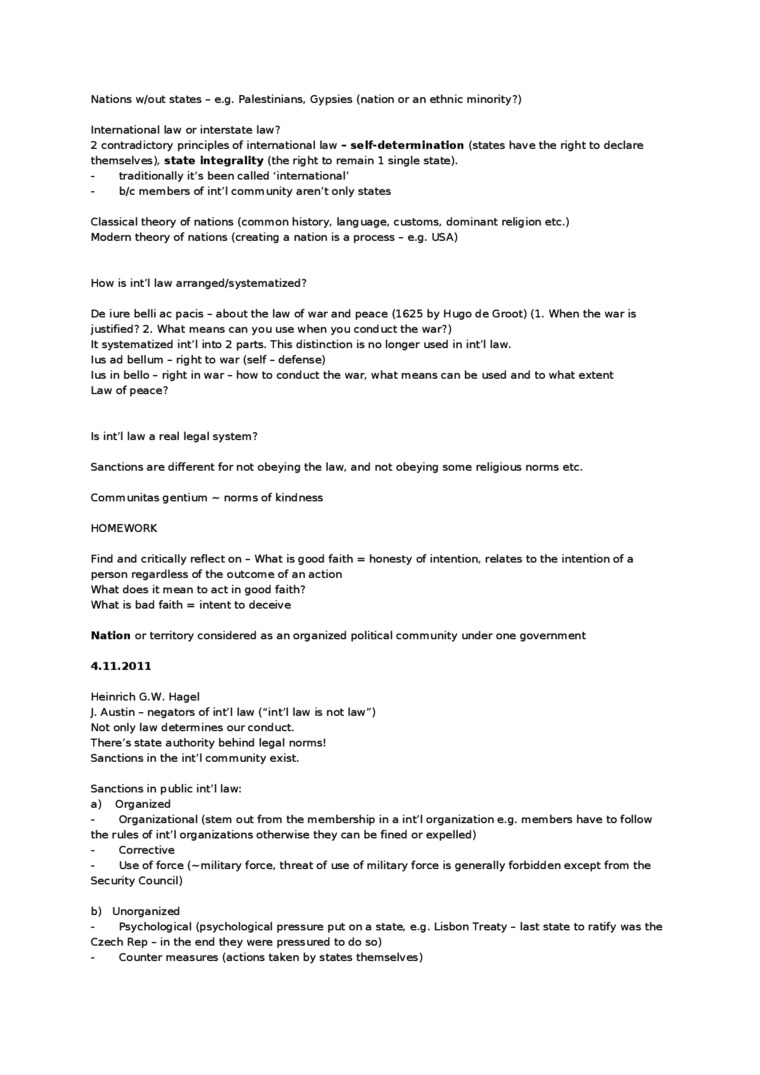24723

Nations w/out States - e.g. Palestinians, Gypsies (nation or an ethnic minority?)
International law or interstate law?
2 contradictory pnnciplesof International law - self-determlnation (states have the rightto declare themselves), state Integrality (the right to remain 1 single State), traditionally it's been called ‘international’ b/c members of int'l community aren t only States
Classical theory of nations (common history, language, customs, dominant religion etc.)
Modem theory of nations (creating a nation is a process - e.g. USA)
How is int'l law arranged/systematized?
De iure belli ac pacis - about the law of war and peace (1625 by Hugo de Groot) (1. When the war is justified? 2. What means can you use when you conduct the war?)
It systematized int'l infco 2 parts. This distinction is no longer used in int'l law. lus ad bellum - right to war (self - defense)
lus in bello - nght in war - how to conduct the war, what means can be used and to what extent Law of peace?
Is int'l law a real legał system?
Sanctions are different for not obeying the law, and not obeying some religious norms etc.
Communitas gentium ~ norms of kindness HOMEWORK
Find and cntically reflect on - What is good faith = honesty of intention, relates to the intention of a person regardless of the outcome of an action What does it mean to act in good faith?
What is bad faith = intent to deceive
Nation or territory considered as an organized polibcal community under one govemment
4.11.2011
Heinrich G.W. Hagel
J. Austin - negators of int'1 law (“int'l law ts not law")
Not only law determines our conduct.
There’s State authority behind legał norms!
Sanctions in the intl community exist.
Sanctions in public intl law:
a) Organized
- Organizational (stem out from the membership in a intl organization e.g. members have to follow the rules of intl organizations otherwise they can be fined or expelled)
Corrective
- Use of force (~military force, threat of use of military force is generally forbidden except from the Security Council)
b) Unorganized
Psychological (psychological pressure put on a State, e.g. Lisbon Treaty - last State to rabfy was the Czech Rep - in the end they were pressured to do so)
Counter measures (actions taken by States themselves)
Wyszukiwarka
Podobne podstrony:
work on national or regional issues. WWF works witli a large number of different groups to achieve i
EPIA 2011 ISBN: 978-989-95618-4-7 In order to use Weka. the extracted gamę States must be converted
screenshot 6 XTwitter Via@ Opt-out of tailoring Twitter
screenshot 2 BUTTON OPTIONSTwitter Via@ Opt-out of tailoring Twitter
screenshot 6 XTwitter Via@ Opt-out of tailoring Twitter
UHAM073 56 * UNDERSTANDING HEADACHES AND M IG RAI N ES she has ruled out all of the dangerous or lif
laalaamask print 1. Print this sheet out and colour it in. 2. Get an adult to cut
NOTĘ BY THE SECRETARIAT Under Article 102 of the Charter of the United Nations every treaty and ever
pomask print 1. Print ttiis sheet out and colour it in. 2. Get an adult to cut out
dipsymask print 1. Print this sheet out and colour it in. 2. Get an adult to cut o
Koyaanisqatsi Life Out Of?lance Cover PROOF OFPURCHASE 1003766 KOYAAMISOATSI LR OUT Of BALANCE £
Koyaanisqatsi Life Out Of?lance Cover PROOF OFPURCHASE 1003766 KOYAAMISOATSI LR OUT Of BALANCE £
Literatura XV F. S. Dunn, The Protection of Nationals. A Study in the Application of International L
NOTĘ BY THE SECRETARIAT Under Anicie 102 of the Charter of the United Nations every treaty and every
UHAM073 56 * UNDERSTANDING HEADACHES AND M IG RAI N ES she has ruled out all of the dangerous or lif
212 G G FLORESCU 6 sovereignty and recognizing the rights stipulated by International law to St
więcej podobnych podstron